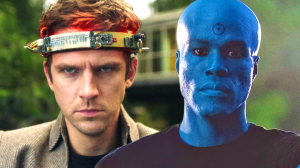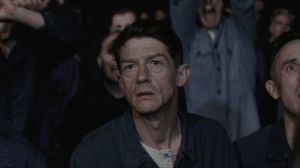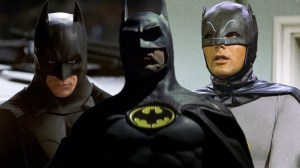When most people think of Stephen King, they normally think about his countless contributions to the world of horror, and rightfully so — the author’s legacy rivals that of literary greats like Edgar Allan Poe and H.P. Lovecraft when it comes to tales that terrify us. His work in the genre often overshadows his more dramatic and emotionally driven works, even though his stories inspired movies like Stand by Me, The Shawshank Redemption, and The Green Mile. Complicating King’s perception in pop culture is that it’s been more than two decades since Hearts in Atlantis hit the big screen, arguably the last time one of his dramatically motivated stories was adapted into a feature film. All of that now changes with The Life of Chuck, an experience that reminds audiences that what makes life worth living are the isolated instances of magic.
Videos by ComicBook.com
The Life of Chuck unfolds in reverse-chronological order, starting with Act III before getting to Act I. In the first segment that audiences witness, the characters on screen face a number of ominous omens, which include the many mysterious billboards and commercials paying tribute to Charles “Chuck” Krantz (Tom Hiddleston). As the story moves forward, we start to learn more about Chuck, his influence on the world around him, and why there’s so much gratitude for him.
Mike Flanagan wrote and directed The Life of Chuck for the big screen, which comes as little surprise to any fan of King. Before Chuck, Flanagan adapted Gerald’s Game, a feat that seemed impossible based on the nature of the narrative, as well as Doctor Sleep, a sequel to King’s The Shining, a tale of terror that many consider the high point of the author’s career. Outside of King adaptations, Flanagan has also delivered genre-bending projects like The Haunting of Hill House, Midnight Mass, and The Fall of the House of Usher for Netflix.
One trend that’s evident in all of Flanagan’s stories, outside of them being well-received by audiences and critics, is how he injects more heart, emotion, and vulnerability than is found in similar contemporary fare. While it’s this emotional core of even the most outlandish of stories that audiences resonate with in Flanagan’s projects, that sincerity is so prevalent that it can sometimes dissuade horror fans who are more interested in superficial scares. Given how interwoven an emotional core is in much of King’s works, it’s a match made in heaven between Flanagan and King, rivaling the mastery a filmmaker like Frank Darabont has with the author’s material. For any fan wondering what a Flanagan project would look like when he got to fully embrace his more heartfelt storytelling inclinations, The Life of Chuck is the answer. Between the script and the direction, it’s growing increasingly rare to see a movie almost entirely devoid of irony, sarcasm, or cynicism. This is still a King story, however, so there are other running themes of otherworldly forces at play, but Chuck is as much of a ghost story as something like A Christmas Carol (a comparison the film itself makes).
The nature of the story being told in reverse chronological order does make for a bit of a disjointed and alienating experience for audiences, reflecting the overall confusion that the characters within the narrative are going through. That said, the interactions between figures who are connecting over the concept of Carl Sagan’s cosmic calendar, a drummer busking on the street, or a dance shared between a grandmother and grandson to Wang Chung’s “Dance Hall Days” feel so painstakingly specific yet entirely universal that it’s hard not to get swept up in the sincerity of these moments. Flanagan fans have seen dozens of moments like these spread across all of his works, which sometimes can feel jarring when juxtaposed with the more frightening nature of other narratives. Chuck, though, feels like Flanagan is delivering a greatest hits of nostalgia, so by the time the credits roll, your memory of the movie is both the more impactful emotional beats while also serving as a metatextual reminder of how its these minute moments that, for better or worse, are ultimately the summation of someone’s life. Despite anyone’s aspirations or far-reaching accomplishments, the memories we have of our own lives are the conversations we had with complete strangers about PornHub or seemingly embarrassing ways we earned scars that stay at the forefront of our consciousness.
In addition to sincerity — which, at times, comes across as corny glee — Flanagan fans have grown accustomed to seeing the same faces pop up among his acting ensembles. Kate Siegel, Mark Hamill, Rahul Kohli, Samantha Sloyan, Carl Lumbly, Jacob Tremblay, and a handful of other regulars all appear, helping elevate the script exactly as you’d expect, while newcomers like Hiddleston, Karen Gillan, Chiwetel Ejiofor, Mia Sara, and Matthew Lillard all make for authentic additions to Flanagan’s company of players. While it might be Hiddleston’s visage of Chuck that is most recognizable and has been highlighted most in marketing materials, Benjamin Pajak’s portrayal of a young Chuck earns more screen time than Hiddleston and his portrayal marks a delightful standout performance among an ensemble of heavy hitters.
Like many of his other projects, Flanagan’s direction, cinematography, and editing feel less like reality and more like a hazy memory of events that occurred. Everything has a soft focus to it and, unless intentionally injected with more energy, they unfold at an amble pace. This tone makes the more frightening scenes in his horror projects all the more jarring, though when a story is almost entirely devoid of such elements, it’s possible that some viewers who don’t immediately connect with the material might be lulled into a sense of stasis, failing to engage with the material being presented. Neither the direction nor the performances ever steals focus away from the story being told, and with the story being on the quieter side of things for both Flanagan and King, it’s easy to see that the experience could lose its grasp on some viewers.
The true power of The Life of Chuck is that you gain more appreciation for it as time goes by. On an initial watch, it’s hard not to get swept up into its optimism and appreciation for the smaller moments in life, no matter how seemingly mundane they might initially appear. As more time passes, the joy of watching the film then becomes one of those seemingly innocuous moments that sticks with you in the newfound appreciation you can bring to even the most humble of encounters you have, which will also have you recontextualizing the earlier sequences in the film that seemed to have been scattershot when you first watched them. The Life of Chuck serves both as a reminder that all of our lives are ultimately the sum of minuscule, magical moments, and also as evidence of how immersing yourself in a compilation of heartfelt, fictional encounters will become one such divine voyage.
Rating: 4 out of 5
The Life of Chuck is out now in select theaters and opens nationwide on June 13th.








